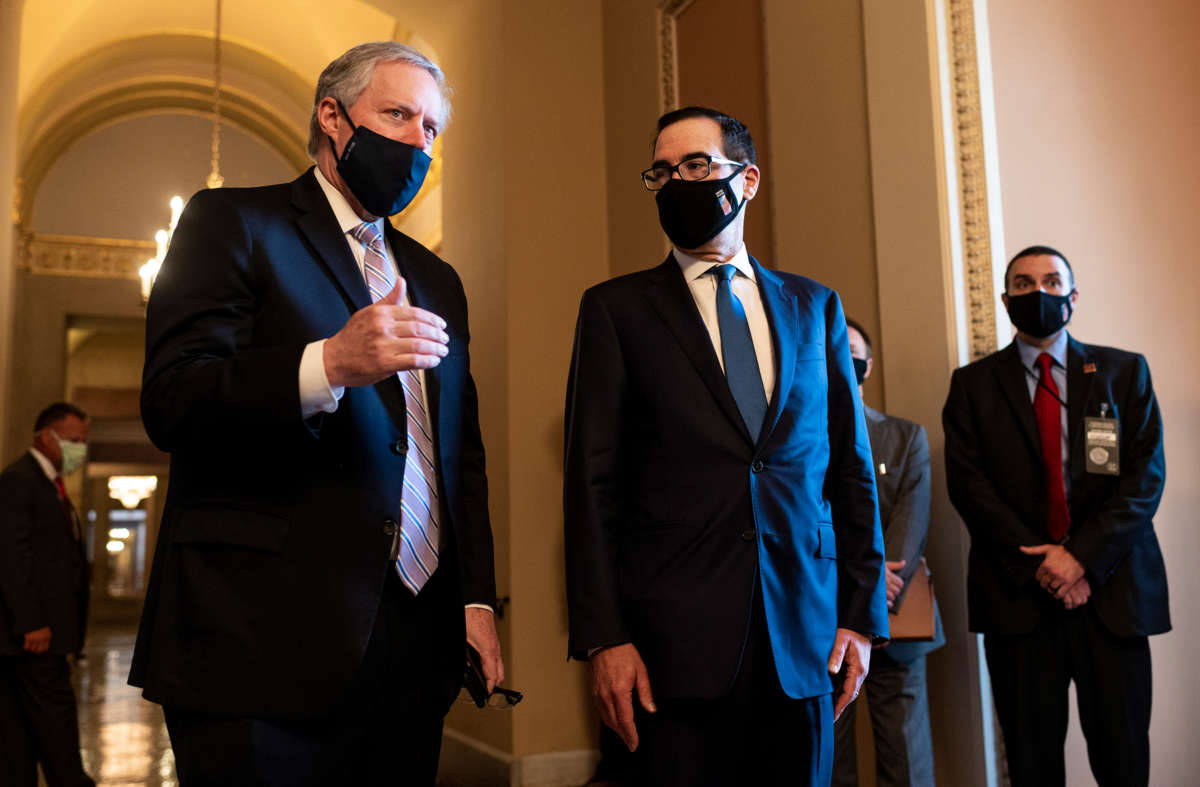Honest, paywall-free news is rare. Please support our boldly independent journalism with a donation of any size.
A Republican proposal to pare back enhanced unemployment benefits to about 70% of what a worker earned prior to losing their job — as opposed to the previous weekly payment of $600 across the board — would take most states between two to five months to implement, likely causing delays in relief for tens of millions of people.
That’s according to a memo (pdf) presented to Congress last week by the National Association of State Workforce Agencies (NASWA), an organization representing state agencies that administer unemployment benefits and other programs.
The memo, obtained by NPR over the weekend, warned that replacing the flat weekly payment with a more complicated individualized benefit based on prior income “would take 8 to 20 weeks or more” for most states to fully implement, depending on the formula the White House and GOP ultimately propose.
Such an implementation delay “could mean a huge gap in payments and a bigger backlog for millions,” noted NPR correspondent Kelsey Snell.
As NPR reported Saturday, “the potential delays are so significant that the U.S. Department of Labor told Congress in May that it ‘strongly’ opposed such a change because states would find it ‘exceedingly difficult if not impossible to implement.'”
The Labor Department, according to a document obtained by NPR, told the House Ways and Means Committee that “states would find it exceedingly difficult, if not impossible to implement a unique payment amount in addition to the various benefit payments to which the [Federal Pandemic Unemployment Compensation] applies.”
Sen. Ron Wyden (D-Ore.), one of the architects of the $600-per-week benefit provided under the CARES Act, tweeted Saturday that “you know Republicans are in pretty bad shape when they have to go with a plan based on rough ideas that Donald Trump’s own Secretary of Labor says are unworkable.”
You know Republicans are in pretty bad shape when they have to go with a plan based on rough ideas that Donald Trump’s own Secretary of Labor says are unworkable. https://t.co/1jpIM5cuAo
— Ron Wyden (@RonWyden) July 25, 2020
The last weekly unemployment check with the flat $600 boost went out in 49 states on Saturday and in New York on Sunday as Congress failed to approve an extension before leaving town for the weekend. Unemployment benefits are set to revert to pre-pandemic levels starting August 1 if Congress does not act.
With tens of millions of Americans facing a massive drop in income in mere days, White House officials on Sunday floated the possibility of quickly passing a narrow bill extending boosted unemployment benefits and granting liability protections to corporations, a top priority of Senate Majority Leader Mitch McConnell (R-Ky.) and the business lobby.
“Honestly I see us being able to provide unemployment insurance, maybe a retention credit to keep people from being displaced or brought back into the workplace, helping with our schools — if we can do that along with liability protections perhaps we put that forward, get that passed as we negotiate on the rest of the bill in the weeks to come,” White House Chief of Staff Mark Meadows said in an interview Sunday on ABC.
McConnell is expected to unveil the GOP’s full coronavirus stimulus package on Monday after delaying release of the legislation due to intraparty disagreements over unemployment benefits and other key issues.
The Washington Post reported Sunday that instead of simply extending the $600-per-week boost in unemployment benefits, Republicans have “discussed a formula that would amount to 70 percent wage replacement of the salary a worker was getting paid before getting laid off.”
“Some economists say the new formula would effectively take the $600 weekly payment to around $200 a week,” the Post noted, “though [Treasury Secretary Steve] Mnuchin stressed on Sunday it would vary from person to person.”
Josh Bivens, research director for the Economic Policy Institute, estimates that reducing the enhanced unemployment payments to $200 per week would cost the United States 3.4 million jobs over the next year.
In a series of tweets on Friday, Rep. Don Beyer (D-Va.) warned that “the damage from a lapse in unemployment benefits will radiate throughout the economy.”
“Any future extension will come too late to help those who are evicted, who lose their jobs, businesses, or health coverage, and those who go hungry,” said Beyer. “This is a dark moment for our country.”
Media that fights fascism
Truthout is funded almost entirely by readers — that’s why we can speak truth to power and cut against the mainstream narrative. But independent journalists at Truthout face mounting political repression under Trump.
We rely on your support to survive McCarthyist censorship. Please make a tax-deductible one-time or monthly donation.
